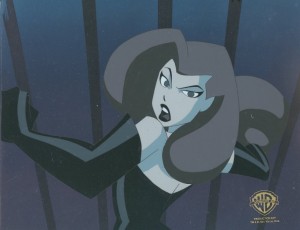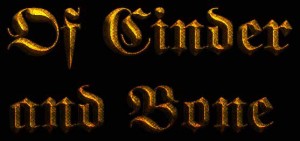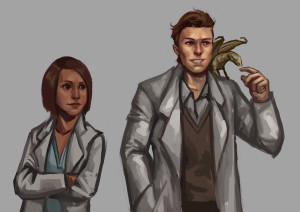
“What do you mean 50 Shades of Grey out-sold Harry Potter?!”
This past week, a buddy of mine and I somehow got into a conversation about representation of women, particularly in science fiction and fantasy movies. At some point, he pointed out how sad it is that rape is too often used as an excuse to show how “evil” a villain is when in fact there are plenty of other ways to indicate it without demeaning women and dredging up unnecessary and unpleasant implications. This discussion really got me thinking about one of the most difficult hurdles I’ve been facing both writing and marketing The Black Parade.
First off, let me just say that I still can’t believe sexism is a thing. Seriously. Women are just people without penises. Why is that hard to comprehend? Anyway, moving on—one of the most commons issues in sci-fi and fantasy is the characterization of the fairer sex. It can fall short for several reasons—stereotyping, laziness, misunderstanding the traits that make women who they are, good old fashioned misogyny—and it’s not limited to urban fantasy, nor is it specific to novels.
For instance, allow me to make a really large group of nerds angry: I don’t like how George Lucas writes women. I truly don’t. I don’t think he’s the worst guy out there, but I actually spent an hour debating with my writing sensei about the characterization of Marion Ravenwood from Raiders of the Lost Ark. For the longest time, I never understood why fans of the movies worshipped Marion and yet they hated Willie from Temple of Doom with a purple passion. I rewatched Raiders recently and I still found Marion to be a useless, shrieking harpy, and I find the fact that people call her an “Action Girl” insulting. She had exactly one useful trait and that was that she had the medallion. Otherwise, there was no reason to write her into the film because they never fully explore her backstory and so she has no personal stake in the story. People point out that they hate Willie because she bitches and moan at every opportunity (and she was doing the director and that’s how she was cast, which I get), but watch the movie again and count how many times Marion whines about something or shrieks Indy’s name. It’s kind of a lot. Plus, all she does is get rescued over and over again throughout the movie, and I don’t think that I should give her points for trying to escape because it still doesn’t make her useful or likable. She talks shit to the bad guys without being able to back it up and she has a serious attitude problem that made me want her face to get melted by the end of the movie.
Now, my Marion Ravenwood rant isn’t here just to enrage some nerds. I’m making a point. I think she was poorly written and executed, but I also think that Lucas did a much better job with Elsa from The Last Crusade. Consider this: she was beautiful, educated, motivated, useful, and cunning. She had her own thoughts and beliefs that were independent from Indy, whereas the other two girls just followed him around and did everything he told them to. She actively disagreed with him and even had the acting chops to trick him into giving her what she wanted. She was a slimy, selfish, ambitious hussy. And guess what? That was fantastic writing. Elsa was a bad girl, one of the worst, and that’s why I liked her. She was still gorgeous and feminine, but she was complicated and layered. With Marion and Willie, what you see is what you get. Not so with Elsa.
So maybe I’m not crazy about Lucas writing women. There are oodles of other beautiful ladies out there kicking butt, right? Of course. I’m proud to see the frothing sea of awesome women in fiction, from books to plays to anime to movies. Hell, I’ve even pointed out my favorite ones before. However, the reason why I felt the need to make a post is because we’re approaching some sort of horizon where the sexism in fiction is going to have to face a major shift.
I made a recent post about the importance of Katniss Everdeen both as a character and as a representation of a sadly underappreciated demographic of women. The current problem in our society is that for every fantastic, well written female protagonist, we have bucketfuls of awful ones. The fact that Bella Swan and Ana Steele will go down in history as two of the most profitable female characters in our history makes me want to Hulk Out and thrash someone Loki-style. Is it true that some women are doormats and hopelessly codependent? Sure. Should we be glorifying it to young, impressionable teens? HELL NO.
And while we’re on the subject, I’ll have to bring up another point that enrages me to the depths of my soul. The third installment to the Chronicles of Riddick series came out a few months ago. Did you see it? I bet you a nickel that you didn’t. Why? It was poorly done and no one cared because Pitch Black was perfect and didn’t need sequels. But that’s not my point.
The Mary Sue made an excellent article that pointed out how unacceptably misogynistic Riddick was and there were tons of comments supporting it, mine included. How is it that the writers/director wrote a movie about a bunch of mercenaries hunting a serial killer on a planet infested with killer aliens…and somehow came out with rampant sexism? The sole female character in the film is constantly verbally harassed by her male counterparts, is the only one to have a pointless topless scene, and contributes little to nothing to the overall story. Oh, and her name sounds like the word “doll.” If you’ve seen Pitch Black, this should make you absolutely furious. Richard B. Riddick is not sexist. Hell, the only reason he doesn’t leave Jack and Imam to die on the planet alone in Pitch Black is because of Carolyn Fry’s bravery and willingness to redeem herself. He actually sheds a tear when she sacrifices herself to save his life at the end. Are you kidding me? How could one possibly make a film so excellent and then write a sequel that is insulting to the very memory of the awesome female characters in Pitch Black?
My attempts to explain this phenomenon unfortunately bring me no comfort. The only reasons I can rationalize are (1) the writers/director decided that it was more important to pander to the He-Man Woman Hater side of the fanbase who thinks women are just things to be objectified (2) they failed to realize that writing a rapist into a story with only one female character makes you look like an insensitive sexist jerkoff. Rape is not to be taken lightly, and it is way too overused in the sci-fi/fantasy genres. There are other ways of presenting threats that don’t have anything to do with sexual interest. This is not to say that no one should ever discuss the subject, (it comes up in my work in small doses) but when it’s used for lazy purposes, it can be insulting to the characters and make the audience angry or uncomfortable. When used that way, it brings up the nasty idea that women can never be the equals with men because most men will never have to worry about the threat of rape unless they go to jail. There are plenty of differences between the male and female experiences. We are obligated as writers to explore them, but that is where the problem with equality in gender representation comes into play. Writing rape as a backstory should never be a shortcut just to squeeze a few tears out of the readers, nor should it just be an easy way to show that a bad guy is really bad.
One last distressing notion is women who are sexist against other women in fiction. It sounds confusing out loud, but sadly, there are a lot of female authors who talk shit about certain kinds of women whom they dislike for whatever reason. It’s time that I draw a line in the sand. If any of you have seen my Youtube series, you know that I greatly dislike the recent works of Laurell K. Hamilton, author of the Anita Blake vampire hunter series. I say recent because the first nine books, while not perfect, are pretty damn good. I grew up reading them. Then I got to Narcissus in Chains and it all came crashing down.
The problem with authors like Hamilton is that they think they are part of the solution when they are in fact part of the problem. For instance, in Cerulean Sins (the novel following Narcissus in Chains), Anita says that one of her clients is not a “liberated woman” because she prefers to be called by her husband’s last name and likes being a wife and mother. Anita’s vastly ignorant statement is not satire or criticism or a character flaw. This bitch actually believes that housewives aren’t “liberated women.” Let that sink in for a minute or two, and then please feel free to flood the author’s Inbox with hatemail at your leisure. In addition to that nonsense, Anita actively bashes feminine women (particularly tall blondes since she is a short brunette), and her author makes a point to show every other woman as either a psychotic kinky slut or a jealous whiner who hates that Anita has a huge harem of supernatural men who follow her around begging her to have awesome sex with them all the time. She makes sure that the male characters constantly dump undeserved praise all over Anita and the only time men don’t want in her pants is when they are gay. All of this is done in a vain attempt to prove how “tough” and “special” Anita is as a character, but all it truly does is make me want to take all of the books after NiC and have a bonfire out in my front yard with them.
Slut shaming is a huge problem in urban fantasy fiction where the female protagonists often have multiple love interests and steamy sex scenes. Sleeping with a bunch of guys can be ill-advised and dangerous, but there is no reason to try to reverse this problem by absolving a main character from any wrongdoing related to sex by making it forced on her by magic. Anita Blake is now a canon serial rapist thanks to vampire mumbo jumbo that forces her to bang her harem boys every day or she’ll die. She’s essentially a succubus with a serious chip on her shoulder. This is and always has been unacceptable. She’s nothing but a Straw Feminist. Hamilton builds up easy targets so she can mow them down with insulting, snotty comments that she thinks make her a feminist and a “liberated woman.” Don’t believe me? Watch the following.
The final point is this: the only way to combat sexism and misogyny in our favorite fiction is to simply speak up about it. Any authors worth their salt hungrily devour their readers’ comments, and if they are well-meaning authors, they can address these issues. Few writers go into a project wanting to make enemies. For the most part, they want their readership to be happy with what they’ve done. That’s why it’s so important to stand up for things that are generally awful like Riddick and Narcissus in Chains. That’s why it’s important for authors to read lots of material and recognize the signs of bad female characterization. It may happen by accident, but it’s still something that can be remedied. Everyone wants to be represented fairly. Women are no different. We’re fantastic and flawed. Write us that way.
-Kyoko



